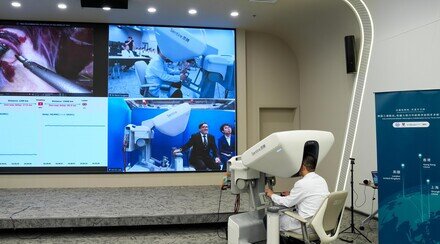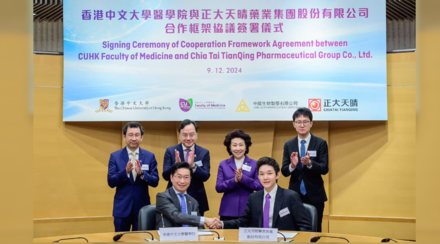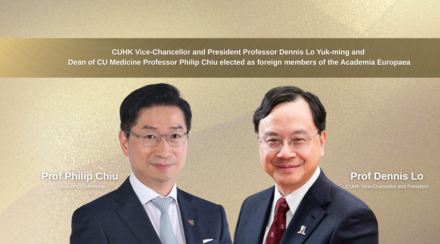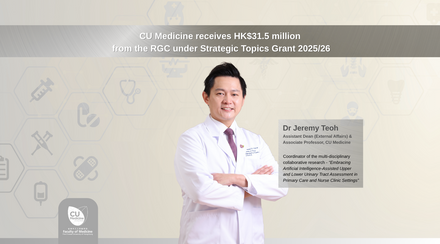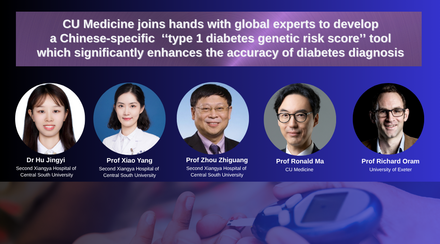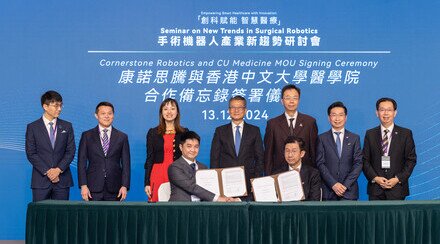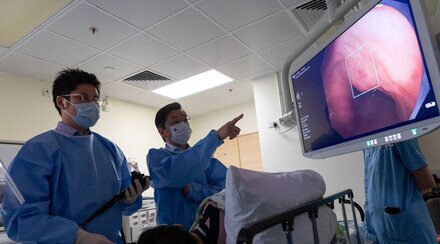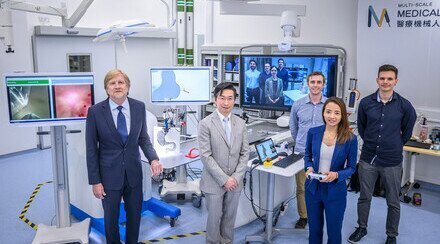The Chinese University of Hong Kong and Imperial College Collaborate on Healthcare Innovation and Biomedical Robotics
The application of innovative technology in medical services has become a global trend and is crucial to the sustainable development of the healthcare sector. The Chinese University of Hong Kong (CUHK) has been dedicated to promoting medical technology advancements with remarkable accomplishments. To further promote healthcare innovations at international level, CUHK has recently established collaboration with Imperial College London to further strengthen cooperation between the two institutions in education and research.
The ageing population and rising living standard in Hong Kong have prompted the rapid development of biomedical engineering and healthcare innovation. CUHK has been actively promoting medical technology development by encouraging multi-disciplinary collaborations to enhance the effectiveness and efficiency of clinical treatments.
Throughout the years, the Faculty of Medicine of CUHK has made remarkable healthcare innovations to make minimally invasive and non-invasive surgery possible. Examples include the endoscopic suturing device ‘Eagle Claw’ which can perform suture plication inside the gastrointestinal lumen to reduce surgical risk induced by invasive surgical procedure; and the hybrid orthopaedic robot which can repair bone fracture or remove tumor precisely. With the help of sophisticated equipment for minimally invasive and non-invasive surgery, the risks of complication and mortality can be significantly reduced. It also shortens patients’ recovery time and lowers the operation cost.
To further enhance knowledge transfer of innovative technologies into clinical practice for the benefit of patients, the Faculty of Medicine has recently set up the Chow Yuk Ho Technology Centre for Innovative Medicine which serves as a platform of academic exchange and collaborations for engineers and clinicians.
Prof. Joseph Sung, Vice-Chancellor and President, CUHK remarked, ‘Innovation and technology is essential to enhance healthcare service. It can improve therapy effectiveness, lower surgical risks, as well as help maintain Hong Kong’s leadership role in international healthcare services. CUHK has been dedicated to the development of healthcare innovation and biomedical engineering. The collaboration with Imperial College London will further sharpen our edge in the field, and is expected to mark a milestone in local as well as global healthcare technology advancement and professional training.’
Prof. Guang-zhong Yang, Director and Co-Founder, Hamlyn Centre for Robotic Surgery, Imperial College London, is glad to work with CUHK research team and enhance academic exchange on healthcare innovation. Prof Yang remarks, “We are delighted to work with the CUHK research teams on healthcare solutions that can reshape the future of patient care and wellbeing. Focusing on technological innovation but with a strong emphasis on clinical translation and direct patient benefit with a global impact, we look forward to working together on some of the groundbreaking topics in imaging, sensing and robotics.”
Prof. Philip Chiu, Director of the Chow Yuk Ho Technology Centre for Innovative Medicine, CUHK, opines, ‘In addition to collaboration in research, CUHK and Imperial College London have established academic exchange programmes for undergraduate and postgraduate students. The programme aims to nurture professionals in healthcare innovation with sound knowledge and global vision.’ Last summer, two CUHK biomedical engineering undergraduate students went to Hamlyn Centre for a 10-week research attachment. Two top undergraduates will go this summer, while another medical student will go there to study a Master programme in robotic engineering.
Prof Chiu adds, ‘Researchers from Faculty of Engineering and Faculty of Medicine have been working closely on three main areas: Robotics & Advanced Technologies, Imaging and Biosensing. The recent establishment of the Technology Center for Innovative Medicine will facilitate our work and we believe that our collaboration with Hamlyn Center will be an inspiring experience which will speed up the development of healthcare technology and bring major advances to clinical practice for the benefits of our patients.’

(From right) Prof. Guang-zhong Yang, Director and Co-Founder, Hamlyn Centre for Robotic Surgery, Imperial College London; Prof. Joseph Sung, Vice-Chancellor and President, CUHK; and Prof. Philip Chiu, Director of the Chow Yuk Ho Technology Centre for Innovative Medicine, CUHK.

Prof. Joseph Sung (left) and Prof. Philip Chiu (right) demonstrate the use of endoscopic surgical robotic system in the resection of early-stage digestive system tumor.

Prof. Yunhui Liu, Professor, Department of Mechanical and Automation Engineering, CUHK demonstrates the robot assistant for hysterectomy introduced in 2014.

Prof. Leung Kwok Sui, Professor, Department of Orthopaedics and Traumatology, CUHK (middle) demonstrates the Hybrid Orthopaedic Robot which has been successfully applied in more than 10 orthopaedic surgeries.

A group photo of the three officiating guests and CUHK researchers involving in the development of biomedical robotics, including Dr. Carmen Poon, Department of Surgery (1st left); Prof. Yeung Yam (2nd left)and Prof. Yunhui Liu (1st right), Department of Mechanical and Automation Engineering; and Prof. Leung Kwok Sui (2nd from right), Department of Orthopaedics and Traumatology.



